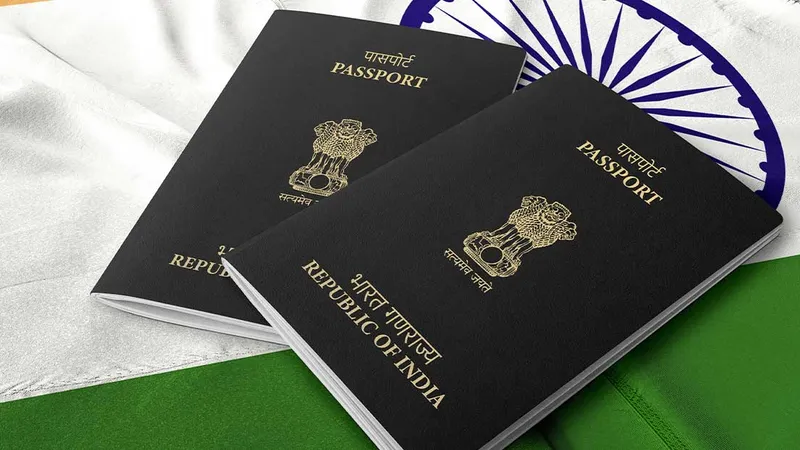The Indian passport has dropped to the 148th position out of 199 countries in the 2025 Nomad Capitalist Passport Index, slipping one spot from its 147th rank in 2024, tying with Comoros at a score of 47.5, according to a report by Scroll.in on April 15, 2025. This decline has stirred a mix of concern and criticism, particularly as other global indices rank India significantly higher, highlighting stark differences in methodology. The Nomad Index’s unique approach, which weighs factors beyond travel freedom, is behind the low ranking, but many argue it paints an incomplete picture of the passport’s strength, fueling discussions about India’s global mobility and perception.
Nomad Capitalist Index: A Broader Lens
The Nomad Capitalist Passport Index evaluates passports based on five weighted criteria: visa-free travel (50%), taxation (20%), global perception (10%), dual citizenship (10%), and personal freedom (10%), as outlined on the Nomad Capitalist website. India’s score reflects a visa-free travel score of 75, granting access to 75 destinations via visa-free entry, visa-on-arrival, or electronic travel authority. Its taxation score is 20, reflecting India’s tax policies, while global perception, dual citizenship, and personal freedom each score 20, based on metrics like the World Happiness Report and Nomad’s proprietary data. This holistic approach, designed for high-net-worth individuals seeking second citizenships, penalizes India for restrictive dual citizenship rules and perceived limits on personal and economic freedoms, dragging its rank below travel-focused indices.
Contrasting Rankings: Henley and Global Indices
In contrast, the Henley Passport Index, published by Henley & Partners, ranks India at 85th in 2025, down five spots from 80th in 2024, with visa-free access to 58 countries, according to their official report. The Global Passport Index, maintained by Global Citizen Solutions, places India at 69th with a mobility score of 75, allowing travel to 29 visa-free countries and 46 with visa-on-arrival or eTA, per their 2025 update. These indices, grounded in International Air Transport Association (IATA) data, focus solely on travel freedom—destinations accessible without a prior visa. India’s access to places like Maldives, Mauritius, and Thailand bolsters its score, showing a stronger travel profile than the Nomad ranking suggests.
Historically, India’s Henley rank has varied, peaking at 71st in 2006 and dipping to 90th in 2021 during COVID-19 restrictions, as noted in Henley’s archives. The 2024 climb to 80th with 62 destinations marked progress, making the 2025 drop to 85th a setback but not a collapse. The Global Passport Index’s higher rank accounts for e-visas and eTAs, which Henley excludes unless issued within three days, explaining some divergence.
Reasons for the Slide
India’s 148th rank in the Nomad Index stems from its multi-factor approach. The visa-free score of 75, while respectable, lags behind leaders like Singapore (195 destinations) or Japan (193), per Henley data. Taxation scores suffer due to India’s progressive tax system, less appealing to the wealthy compared to tax-friendly nations like Ireland, which tops Nomad’s list at 109. Global perception, dual citizenship restrictions, and personal freedom—tied to metrics like press freedom and individual rights—further lower India’s rank, as Nomad Capitalist’s methodology emphasizes these for affluent clients. The Henley drop to 85th reflects tighter global policies, with countries like Serbia imposing visa requirements under EU pressure, reducing India’s visa-free access, according to Henley’s 2025 report.
Implications and Reactions
For most Indian travelers, the Nomad rank matters less than Henley or Global scores, which directly affect trip planning. Access to 58-75 destinations—think Bhutan, Nepal, or Thailand—is solid but trails top passports’ 190+ entries. The Nomad Index resonates more with high-net-worth individuals eyeing second citizenships, where India’s tax and freedom scores hurt its appeal. Still, the 148th rank has sparked concern, with Scroll.in noting it as a blow to India’s global image, especially amid claims of rising international clout.
Critics argue the Nomad Index’s criteria skew against developing nations, favoring tax havens or small EU states, while Henley’s travel-focused rank is fairer for everyday use. Supporters of India’s progress highlight gains—visa-free access grew from 52 countries in 2014 to 58 in 2025, per Henley—outpacing many peers, even if others have advanced faster. The debate centers on perspective: Nomad’s rank reflects a niche view, while Henley and Global better capture travel practicality.
The slip to 148th in the Nomad Index is a talking point, not a travel barrier. India’s diplomatic efforts, like securing visa-free access to Thailand, show progress, but boosting global mobility requires more reciprocal agreements, especially in Europe. For travelers, Henley’s 85th or Global’s 69th rank offers a clearer guide—stick to those for planning. The Nomad score’s a wake-up call for policymakers to address perception and policy gaps, but it’s not the full story. India’s passport is stronger than a decade ago, and with strategic moves, it could climb higher—Nomad or not.

